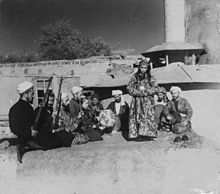
Back باشا بازي Arabic باشا بازى ARZ Bacha bazi AST Baça bazı Azerbaijani Bacha bazi Catalan Bačabazi Czech Bacha bazi German Μπατσά μπαζί Greek Baĉabazio Esperanto Bacha bazi Spanish


Bacha bāzī (Persian: بچه بازی, lit. 'boy play')[1] is a practice in which men (sometimes called bacha baz) buy and keep adolescent boys (sometimes called dancing boys) for entertainment and sex.[2][3] It is a custom in Afghanistan and in historical Turkestan[citation needed] and often involves sexual slavery and child prostitution by older men of young preteens and adolescent males.[4]
Bacha bazi was outlawed during the Islamic Emirate of Afghanistan period by the Taliban.[5][6][7]The act was punishable by death per Islamic law.[8][9]
The practice of bacha bazi by warlords was one of the key factors in Mullah Omar creating the Taliban due to his distaste for it and it’s unislamic nature.[10]Mullah Omar’s stance against Bacha Bazi made him very popular among the Afghan people who were very much disturbed by the practice. Reportedly, in early 1994, Omar led 30 men armed with 16 rifles to free two young girls who had been kidnapped and raped by a warlord, hanging him from a tank gun barrel.[11]
Nevertheless, after the US invasion it was then again widely practiced. Force and coercion were common, and security officials of the Islamic Republic of Afghanistan stated they were unable to end such practices and that many of the men involved in bacha bazi were powerful and well-armed warlords.[12][13][14]
Under the Islamic Republic government, the practice of dancing boys was illegal under Afghan law, but the laws were seldom enforced against powerful offenders, and police had reportedly been complicit in related crimes.[15][16] The practice of bacha bazi had increased under the rule of the Islamic Republic government.[17][18] On 23 September 2016, the Taliban militants in northern Baghlan province executed a man and a boy on charges of “bacha bazi” (pederasty).[19]
U.S. government forces in Afghanistan after the invasion of the country reportedly deliberately ignored bacha bazi abuse by Afghan allies.[20] This caused controversy. The U.S. military responded by claiming the abuse was largely the responsibility of the "local Afghan government".[citation needed]
In 2021 when the Taliban regained control of Afghanistan they reinstated the death penalty for anyone involved in Bacha bazi.[21]
- ^ Cite error: The named reference
nordlandwas invoked but never defined (see the help page). - ^ Cite error: The named reference
:4was invoked but never defined (see the help page). - ^ Jones, Samuel V. (2015-04-25). "Ending Bacha Bazi: Boy Sex Slavery and the Responsibility to Protect Doctrine". Indiana International & Comparative Law Review. 25 (1): 63. doi:10.18060/7909.0005. ISSN 2169-3226.
- ^ "Boys in Afghanistan Sold Into Prostitution, Sexual Slavery" Archived 2013-12-03 at the Wayback Machine, Digital Journal, Nov 20, 2007
- ^ Qobil, Rustam (September 7, 2010). "The sexually abused dancing boys of Afghanistan". BBC News. Archived from the original on 18 August 2019. Retrieved 9 May 2016.
I'm at a wedding party in a remote village in northern Afghanistan.
- ^ Mondloch, Chris (Oct 28, 2013). "Bacha Bazi: An Afghan Tragedy". Foreign Policy Magazine. Retrieved Apr 23, 2015.
- ^ Wijngaarden, Jan Willem de Lind van (October 2011). "Male adolescent concubinage in Peshawar, Northwestern Pakistan". Culture, Health & Sexuality. 13 (9). Taylor & Francis, Ltd: 1061–1072. doi:10.1080/13691058.2011.599863. JSTOR 23047511. PMID 21815728. S2CID 5058030. Archived from the original on 4 July 2021. Retrieved 26 December 2020.
- ^ "What About the Boys: A Gendered Analysis of the U.S. Withdrawal and Bacha Bazi in Afghanistan". Newlines Institute. 24 June 2021. Retrieved 18 August 2021.
- ^ "Bacha bazi: Afghanistan's darkest secret". Human Rights and discrimination. 18 August 2017. Archived from the original on 22 August 2021. Retrieved 18 August 2021.
- ^ "Bacha Bazi: An Afghan Tragedy". October 2013.
- ^ National Geographic (2007). Inside The Taliban. National Geographic (Documentary). Afghanistan. Archived from the original on 7 October 2012.
- ^ "Transcript". ec2-107-21-207-21.compute-1.amazonaws.com. Archived from the original on 2014-12-14.
- ^ Roshni Kapur, The Diplomat. "Bacha Bazi: The Tragedy of Afghanistan's Dancing Boys". The Diplomat. Archived from the original on 2021-03-08. Retrieved 2021-02-12.
- ^ "Afghan boy dancers sexually abused by former warlords". Reuters. 2007-11-18. Archived from the original on 2008-01-11. Retrieved April 30, 2015.
- ^ Quraishi, Najibullah Uncovering the world of "bacha bazi" Archived 2016-04-10 at the Wayback Machine at The New York Times April 20, 2010
- ^ Bannerman, Mark The Warlord's Tune: Afghanistan's war on children Archived 2017-08-31 at the Wayback Machine at Australian Broadcasting Corporation February 22, 2010
- ^ "Bacha bazi: the scandal of Afghanistan's abused boys". The Week. 29 January 2020. Archived from the original on 22 August 2021. Retrieved 16 April 2020.
- ^ "Afghanistan must end the practice of bacha bazi, the sexual abuse of boys". European Interest. 25 December 2019. Archived from the original on 28 April 2021. Retrieved 16 April 2020.
- ^ "Taliban kill 2 people over "bacha bazi" in Baghlan – Archive".
- ^ Goldstein, Joseph (2015-09-20). "U.S. Soldiers Told to Ignore Sexual Abuse of Boys by Afghan Allies". The New York Times. ISSN 0362-4331. Archived from the original on 2015-09-21. Retrieved 2018-01-24.
- ^ Cite error: The named reference
:3was invoked but never defined (see the help page).
© MMXXIII Rich X Search. We shall prevail. All rights reserved. Rich X Search